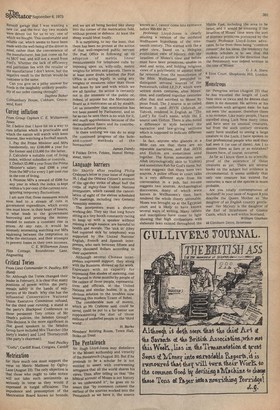Language barriers
Sir: Shortly after reading Philip Crabtree's letter in your issue of August 16, I ?e' ad the Ottawa Citizen's account of the one-day strike of about half the corps of eighty-four United Nations interpreters, which caused the cancellation of eight of the eleven scheduled UN meetings, including two General Assembly sessions.
The interpreters want a shorter working day. They say that long hours sitting in a tiny booth constantly rating to keep up with a speaker without missing a single nuance, are harmful to health and morale. The 'sick in' (they had reported sick by telephone) was Supported by the United Nations' English, French and Spanish interpreters, who earn between fifteen and thirty thousand dollars according to their experience.
Although several Chinese interpreters expressed support, they along with the Russians, showed up for work. Esperanto with its capacity for expressing fine shades of meaning, can be learned in three months by people of the calibre of those people, representatives and officials, at the United Nations and similar bodies. It is the obvious solution to the troubles now besetting this modern Tower of Babel.
The considerable sum of money, Which as Mr Crabtree said, could be saved, could be put to a far better use supplementing the diet of those millions of underfed people in the 'third world'.
H. Barks Members' Retiring Room, Town Hall, Stoke-on-Trent


































 Previous page
Previous page